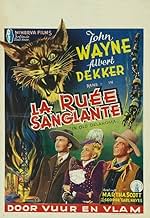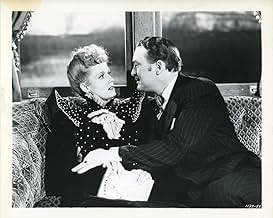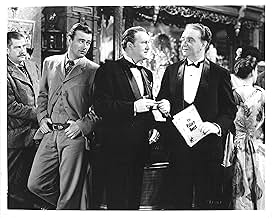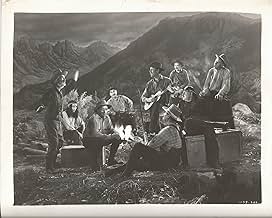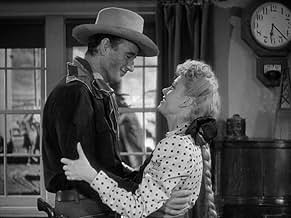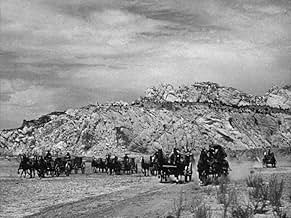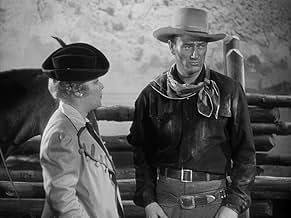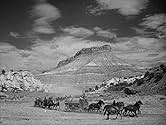ÉVALUATION IMDb
6,3/10
1,7 k
MA NOTE
En 1906, sur les terres indiennes de l'Oklahoma, un cow-boy se bat pour les droits de bail pétrolier contre un pétrolier avide tandis qu'un joli instituteur vole le coeur des deux hommes.En 1906, sur les terres indiennes de l'Oklahoma, un cow-boy se bat pour les droits de bail pétrolier contre un pétrolier avide tandis qu'un joli instituteur vole le coeur des deux hommes.En 1906, sur les terres indiennes de l'Oklahoma, un cow-boy se bat pour les droits de bail pétrolier contre un pétrolier avide tandis qu'un joli instituteur vole le coeur des deux hommes.
- Director
- Writers
- Stars
- Nommé pour 2 oscars
- 2 nominations au total
Foncilla Adams
- Girl
- (uncredited)
Stanley Andrews
- Mason - Indian Agent
- (uncredited)
Charles Arnt
- Joe - Train Conductor
- (uncredited)
Avis en vedette
Two women, Ethel Hill and Eleanore Griffin, share screen writing credit for Republic's western adventure film WAR OF THE WILDCATTERS (known to some as IN OLD OKLAHOMA). A modestly budgeted endeavor, the story comes to life thanks in large part to a cast that includes John Wayne, Martha Scott, Albert Dekker, Gabby Hayes and Marjorie Rambeau. Wayne, from a different school of acting than the others, rises to the occasion and matches his costars with his own unique strength and performance. In addition to the acting, the motion picture benefits from extensive on-location shooting, which lends a degree of realism. Not to be missed-- there is an impressive moment when oil is struck and a huge gusher comes in.
A lesser entry in the John Wayne canon, but not without interest. I thought Duke did quite well with the light comedy in the first part of the film before getting tough later on. And he looks as good as he ever did.
I liked the opening scene as the camera panned along the train interior catching the comments of the passengers - including, I'm sure, Guinn "Big Boy" Williams who had a few words to say, though the film doesn't appear in his filmography on this site or in Quinlan.
Albert Dekker is quite a likable villain, and, for the era in which the film was made, it's quite clear what his intentions are towards Martha Scott; the innuendo is strong, and in the hotel she even looks into the room adjoining hers and gasps when she spots the bed where he wants her to end up.
I'm a bit dubious about the total oil capacity of the various wagons at the end of the film and how easily some of the explosions occurred, but the sequence is quite a novel one. And the period - very early 20th century - is an interesting one, with the film making several allusions to the new life-style that will be made possible by oil.
Apparently Rhonda Fleming is in the chorus line in her very first film, and Gabby Hayes isn't too annoying in his customary old coot/sidekick role.
I liked the opening scene as the camera panned along the train interior catching the comments of the passengers - including, I'm sure, Guinn "Big Boy" Williams who had a few words to say, though the film doesn't appear in his filmography on this site or in Quinlan.
Albert Dekker is quite a likable villain, and, for the era in which the film was made, it's quite clear what his intentions are towards Martha Scott; the innuendo is strong, and in the hotel she even looks into the room adjoining hers and gasps when she spots the bed where he wants her to end up.
I'm a bit dubious about the total oil capacity of the various wagons at the end of the film and how easily some of the explosions occurred, but the sequence is quite a novel one. And the period - very early 20th century - is an interesting one, with the film making several allusions to the new life-style that will be made possible by oil.
Apparently Rhonda Fleming is in the chorus line in her very first film, and Gabby Hayes isn't too annoying in his customary old coot/sidekick role.
One of Poverty Row studio Republic's intermittent big-budget efforts, War of the Wildcats is a lively, if fairly routine, western notable for its early 20th-century setting. Wayne plays Daniel F. Somers, formerly one of Teddy Roosevelt's rough riders, who finds himself entangled in a love-and-oil battle with Albert Dekker. Wayne is fairly amiable here, representing the old west and the little man forced to adapt in the face of modern technology and the dawn of big business. Dekker, of course, represents this future. He drives one of them new-fangled auto-mobeels and is erecting oil wells just as fast as he can. He is also dismissive of the native population he even has one, a Cherokee, scrub his back as he takes a bath while Wayne shows them respect and receives it in return. I'm not quite sure how that stacks up today, given our knowledge that the treatment of the native American by the old west fell somewhat short of what can be considered fair.
Anyway, possibly the best aspect of this film is that Dekker's character isn't portrayed as an out-and-out villain, driven only by greed. He is smart and relatively sophisticated, and also brave. Anyone who has ever had the experience of working with or for a 'captain of industry' (for want of a better term) or a self-made man, will probably recognise oilman Gardner's characteristics exactly as those that account for the success of these people. They aren't necessarily bad people, just ruthless enough to do whatever is necessary in pursuit of their goals.
Martha Scott is a fairly bland heroine it's difficult to see why such rugged individuals as Somers and Gardner would both be so keen to bed her. Gardner's frankness in this matter is also refreshing given the times in which this film was made. He makes no secret of what he desires from Catherine and doesn't resort to any particular underhand tactics to make his desires come true. Of course, he doesn't succeed it would be another quarter of a century before Hollywood would allow a character like Jim Gardiner to win the girl (and the oil).
Anyway, possibly the best aspect of this film is that Dekker's character isn't portrayed as an out-and-out villain, driven only by greed. He is smart and relatively sophisticated, and also brave. Anyone who has ever had the experience of working with or for a 'captain of industry' (for want of a better term) or a self-made man, will probably recognise oilman Gardner's characteristics exactly as those that account for the success of these people. They aren't necessarily bad people, just ruthless enough to do whatever is necessary in pursuit of their goals.
Martha Scott is a fairly bland heroine it's difficult to see why such rugged individuals as Somers and Gardner would both be so keen to bed her. Gardner's frankness in this matter is also refreshing given the times in which this film was made. He makes no secret of what he desires from Catherine and doesn't resort to any particular underhand tactics to make his desires come true. Of course, he doesn't succeed it would be another quarter of a century before Hollywood would allow a character like Jim Gardiner to win the girl (and the oil).
Spanish American War Veteran John Wayne hitches a ride on oil magnate Albert Dekker's private railroad car just as he's putting the moves on traveling school teacher Martha Scott. That sets off a rivalry between them both professional and personal as Wayne gets under Dekker's skin.
Dekker's the big kahuna in Oklahoma territory which would soon be admitted under President Theodore Roosevelt to the union. He's crowding a lot of the small operators out of the field and they see in Wayne a leader and savior.
Later on when Wayne and Dekker compete with the rival proposals for leasing Indian oil lands they go to the White House where Dekker thinks he's got an inside track with the Interior Department. This leads to one of the three best scenes in the film. It turns out that the Duke served in the Rough Riders. The reunion of Wayne and Sidney Blackmer as Theodore Roosevelt is pretty good, who'd have thought Wayne would have had the ultimate inside track.
Dale Evans is in the film, she has a brief role as a saloon entertainer and sings a couple of period songs. She had not yet met her future husband Roy Rogers on the Republic lot, but in fact she was more the westerner than he in real life. He was from a rural Ohio town and she was from Uvalde, Texas. Dale also sang with Anson Weeks band before coming west both literally and figuratively.
Martha Scott is a good crinolined heroine wooed by both Wayne and Dekker. You will also see Grant Withers in one of his few roles in which he wasn't a villain.
Second best scene in the film, John Wayne emptying his pistol into Paul Fix who played one of Dekker's henchmen who actually goes a bit too far because of his personal hatred for Wayne.
Third best scene, the climatic rush to deliver oil by covered wagons and tankers when Dekker buys the pipeline to fulfill the contract. The normally parsimonious Republic studio and its boss Herbert J. Yates broke the piggy bank to stage this one in what was obviously their big budget film of the year. Still plays quite well today.
This is one of John Wayne's better films of the forties. He's given good production values in this western and a perfect role for him. Fans of the eternal Duke should not miss this one.
Dekker's the big kahuna in Oklahoma territory which would soon be admitted under President Theodore Roosevelt to the union. He's crowding a lot of the small operators out of the field and they see in Wayne a leader and savior.
Later on when Wayne and Dekker compete with the rival proposals for leasing Indian oil lands they go to the White House where Dekker thinks he's got an inside track with the Interior Department. This leads to one of the three best scenes in the film. It turns out that the Duke served in the Rough Riders. The reunion of Wayne and Sidney Blackmer as Theodore Roosevelt is pretty good, who'd have thought Wayne would have had the ultimate inside track.
Dale Evans is in the film, she has a brief role as a saloon entertainer and sings a couple of period songs. She had not yet met her future husband Roy Rogers on the Republic lot, but in fact she was more the westerner than he in real life. He was from a rural Ohio town and she was from Uvalde, Texas. Dale also sang with Anson Weeks band before coming west both literally and figuratively.
Martha Scott is a good crinolined heroine wooed by both Wayne and Dekker. You will also see Grant Withers in one of his few roles in which he wasn't a villain.
Second best scene in the film, John Wayne emptying his pistol into Paul Fix who played one of Dekker's henchmen who actually goes a bit too far because of his personal hatred for Wayne.
Third best scene, the climatic rush to deliver oil by covered wagons and tankers when Dekker buys the pipeline to fulfill the contract. The normally parsimonious Republic studio and its boss Herbert J. Yates broke the piggy bank to stage this one in what was obviously their big budget film of the year. Still plays quite well today.
This is one of John Wayne's better films of the forties. He's given good production values in this western and a perfect role for him. Fans of the eternal Duke should not miss this one.
In imdb, it's In old oklahoma.... roku has this as war of the wildcats 1943; the opening credits show wildcats. Stars john wayne, al dekker. When school teacher catherine allen heads west to really experience life, she bumps smack into wildcat oilman jim gardner and cowboy dan somers. Of course, they both chase after her. As well as oil rights. And what kind of a western would this be without gabby hayes? And dale evans in one of her earlier roles. It's silly and fun and moves right along. Better than your average western. Not dry and dusty like so many others. Directed by albert rogell. Nominated for best music and best sound.
Le saviez-vous
- AnecdotesSidney Blackmer made a career out of playing Teddy Roosevelt. He played him eight times in various film projects. 1-"This Is My Affair" (1937) 2-"The Monroe Doctrine" (1939) 3-"Teddy the Rough Rider" (1940) 4-"March On, America!" (1942) 5-"In Old Oklahoma" (1943), 6-"Bill "Buffalo Bill" (1944) 7-"My Girl Tisa" (1948) 8-"Never Kick a Man Upstairs" (TV Movie) (1953).
- Citations
Bessie Baxter: We've got a long way to go, and a short time to get there.
- ConnexionsEdited into Six Gun Theater: In Old Oklahoma (2021)
Meilleurs choix
Connectez-vous pour évaluer et surveiller les recommandations personnalisées
- How long is In Old Oklahoma?Propulsé par Alexa
Détails
- Durée1 heure 42 minutes
- Couleur
- Rapport de forme
- 1.37 : 1
Contribuer à cette page
Suggérer une modification ou ajouter du contenu manquant


